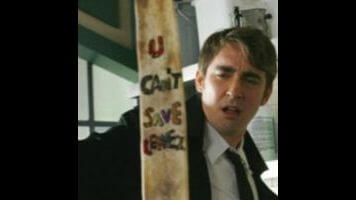Pushing Daisies: "Oh Oh Oh ... It's Magic"

Genevieve asked me to pinch-hit this week while she attends to other obligations. By way of sweetening the pot, she proffered possibly the last chance to share my thoughts on the show "since it's apparently been 'about to be canceled' for what, a month now?"
But surely this is not a show about to be canceled. Not the show that produced this week's delightful and moving meditation on the theme of absent parents and the magic of a new perspective on the past. The evidence in front of us is not a show that's concerned about its failure to find a large audience; if anything, it's less like a show interested in making new fans than it's ever been. Week by week, it seems to become more and more like itself, reveling in its byzantine dialogue, broad characterizations, and arcane, fantastical metaphors for existential crises, as if insulated from the task of finding an audience or attracting advertisers.
And of course, that's what I love about it. Those of us who love television love lost causes most of all, clinging to every moment more strongly as doom approaches. If Pushing Daisies isn't long for this world, isn't it marvelous to see it live on each week as carelessly as if its producers could resurrect it with a touch, but as urgently as if the next touch could spell doom?
This week's special guest corpse is the Great Herrmann, played by the suddenly ubiquitous Fred Willard (whose newly svelte physique was also featured on Worst Week recently). Ned's half-brothers Maurice and Ralston dragged him to a magic show at the Conjurer's Castle, where Herrmann nightly performs his signature trick, Cementia! — an escape act in which the performer is locked into a box that is then filled with quick-setting cement. Herrmann wants Emerson Cod to solve the mystery of his sequentially murdered animal assistants, but it turns out that the killer was going after the magician and not his menagerie, as proven when the box suddenly proves escape-proof. Our bloodhound gang has to find out who did the killing, while Ned deals with his daddy issues (which cause uncontrollable acid reflux). And oh yes, the sinister Dwight visits Chuck's aunts, looking for Chuck's father's watch, which he claims to have agreed to bury in the desert sands as part of some odd tontine with his old UN peacekeeping buddy.
Take our characters and put them in another setting, and suddenly we see sides of them that we hadn't seen before. Although the men view all the magicians with suspicion, Chuck and Olive respond with unabashed delight, participating in every bit of stage business offered to them. (My favorite is when Emerson demands more money to investigate animal murders, and Herrmann asks him to blow on his closed hands to conjure up the money. Emerson rolls his eyes, but the women eagerly lean in and puff, then clap gleefully when the money appears.) They seem to want to see magic in every moment (Olive even anticipates the pie illusion performed by the twins before the reveal, squealing, "You just magically julienned the cherries!"), while the men distrust the motives of people who seem to interested in entertaining them — or perhaps deceiving him.
Ned has grown to associate magic with his dad, so much so that he begins to combine the words obsessively: "magic dad." Herrmann becaming another magic dad, albeit a reluctant one, to the twins after their own magic dad performed the cruelest disappearing act of all. But the episode presents magic as an accomplishment — something to be practiced diligently, a ticket to status and success. By contrast, The Geek, who succumbed to jealousy over the failure of Herrmann to play the role of magic dad to him, has only a freakish ability. It's distinct from real achievement. And what is Ned's ability — freak show or hard-earned gift? Is it how you acquire it, or what you do with it that matters?
Sometimes I think Daisies tries too hard to manufacture emotional resonance week after week. But this episode's denouement, with Ned and Chuck touching through the plexiglass barrier while a wired Olive relays Aunt Lily's message to her supposedly dead daughter, seemed fully earned, and quite wonderful. And Dwight finding Charlotte Charles's empty grave? The most impressive magic trick is how sweet Stephen Root gets more and more menacing every time he comes on screen.
Grade: A
Stray observations:
– That's one sad ghost costume worn by young Ned in the opening, positively Charlie Brownesque.
– "Where did I put that rat's ass I could give?" muses Emerson in response to the twin's invitation to the magic show.
– Chuck and Olive come up with fabulous gowns to wear to the show. Although Chuck's looked a bit painful around the upper chestal area while she was sitting, that long featured cape was quite an effect.
– The Great Herrmann greets a reluctant piemaker: "I'm already hugging you and there's nothing you can do about it!" When Olive petitions for her turn, he mutters: "I'm not made of hugs."
– Ah, the rhetorical and comedic power of repetition. Herrmann's magical legacy to his long-suffering assistant (played by Kerri Kenney-Silver from The State): The Magic Book Of Magic. Lily's description of the time of Chuck's birth at the nunnery: "Right in the middle of mid-middle-morning prayers."
– "The killer knows how to make a sandwich!"